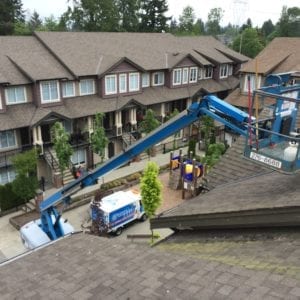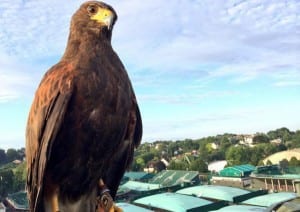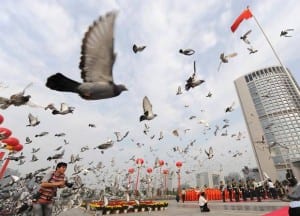
by Pigeon Patrol | Sep 13, 2015 | Animal Deterrent Products, Bird Deterrent Products, Bird Netting, Pigeon Patrol's Services
 A self-proclaimed bird rescuer has condemned the use of netting to deter nesting seagulls after spotting 14 dead birds trapped on a supermarket roof.
A self-proclaimed bird rescuer has condemned the use of netting to deter nesting seagulls after spotting 14 dead birds trapped on a supermarket roof.
Outraged Steven Ault, 40, of The Crescent in Bridlington, was in the Boyes café on Chapel Street when he saw the birds tangled in netting on the roof of Iceland.
“I couldn’t believe what I saw. It is appalling and that is the view from the cafe,” said Mr Ault, who regularly checks netting in Bridlington for birds in distress.
He was quick to act, asking staff at Iceland to remove the dead birds and informing the RSPCA. However, he was informed the supermarket staff were not authorised to go on the roof.
He said: “I think bird netting should be made illegal. Looking at that roof it is a great roof for birds nesting. I can’t see that they would cause any trouble on there. It is very vindictive. The netting causes more trouble than the birds ever could.”
And it is not the first time he has witnessed upsetting treatment of seagulls, as he has seen two gulls shot in Fairfield Road.
“People are scared of them and when you are scared you lose all your compassion towards them,” said Mr Ault.
A spokesperson for Iceland said: “We apologise for any distress caused by the netting and associated problems on the roof of our Bridlington store. Our store colleagues are not permitted to climb onto the roof to clear it themselves for health and safety reasons, but we are working with a qualified company to clear up the area ASAP and will strive to keep this area as clear as possible.”
A spokesperson for the RSPCA said: “The RSPCA is opposed, in principle, to killing or taking wildlife – in circumstances where there is a proven case for controlling wild animals, we advocate
the use of non-harmful methods of deterrence where possible.
“Bird deterrent netting can be an effective means of keeping birds off structures as it can prevent problems without needing to resort to other measures such as killing birds.
“However, it’s vitally important that any netting is properly installed and maintained.
“Problems arise when netting is incorrectly installed or when it becomes damaged and is not repaired, leaving gaps where birds are able to enter and become trapped. If the netting is not checked or maintained, there is a risk that birds may suffer and die from injury or starvation.”
The RSPCA acts swiftly once a trapped bird – alive or dead – is reported and sends a letter to the building owner requesting the problem is rectified.
The spokesperson continued: “Unfortunately however, there are situations where we do not hear back from the owner, or we are informed by the public that nothing has been done to fix, remove or replace the netting. In these incidents, we will send reminder letters and escalate the situation as necessary.”
About Pigeon Patrol:
Pigeon Patrol Products & Services is the leading manufacturer and distributor of bird deterrent (control) products in Canada. Pigeon Patrol products have solved pest bird problems in industrial, commercial, and residential settings since 2000, by using safe and humane bird deterrents with only bird and animal friendly solutions. At Pigeon Patrol, we manufacture and offer a variety of bird deterrents, ranging from Ultra-flex Bird Spikes with UV protection, Bird Netting, 4-S Gel and the best Ultrasonic and audible sound devices on the market today.
Voted Best Canadian wholesaler for Bird Deterrent products four years in a row.
Contact Info: 1- 877– 4– NO-BIRD (www.pigeonpatrol.ca)

by Pigeon Patrol | Sep 12, 2015 | 4-S Gel Bird repellent, Bird Netting, Pigeon Patrol's Services, Pigeon Spikes, Pigeons in the News, UltraSonic Bird Control
PEOPLE who want to feed pigeons in a Bradford suburb should have a designated place to go to, according to one councillor.
Cllr Mohammed Shafiq said droppings are making life a misery for many residents on a daily basis in the Bradford Moor neighbourhood where pigeons are being pampered.
Droppings are covering rooftops, porches and windows in some streets particularly in Wensleydale Road and a children’s play area at the back of Derby Place.
 He is worried the droppings are not only a health hazard and could attract more vermin into the streets but are also damaging the look of the area.
He is worried the droppings are not only a health hazard and could attract more vermin into the streets but are also damaging the look of the area.
Cllr Shafiq (Lab, Bradford Moor) says leftover chappatis and raw rice are being scattered early in the morning by people, some in the spiritual belief that by feeding the pigeons any problems they are experiencing within their families will be resolved.
He added: “Other might just be doing it to use up leftovers and be kind to the birds but there are those who believe it will help them personally – and their families.
“I have spoken to local spiritual leaders who tell me they are not encouraging this but the belief is there and people will keep doing it.”
Cllr Shafiq said that is why he is contacting Labour-run Bradford Council and its portfolio holder for the environment, Councillor Andrew Thornton asking it to designate a special pigeon feeding area on an area of scrap land, away from homes, where people could go and feed pigeons without a guilty conscious.
The lake in Bradford Moor Park is also getting filled with chappati scraps which is another problem that needs addressing by the Council, he added.
“It is about behaviour modification and I feel having a set area where people can go and feed the birds without feeling they are under the spotlight for doing something wrong,” said Cllr Shafiq.
“There are plenty pieces of scrap land in this area, there’s a derelict place just off Dick Lane.”
Most councils try to deter people from feeding wild pigeons due to the problems highlighted by Cllr Shafiq and in extreme cases can go further.
Earlier this year Birmingham City Council threatened to take a man to court after he was seen persistently feeding the pigeons despite being warned against doing so.
Cllr Thornton told the Telegraph & Argus last night: “We note the intention of Cllr Shafiq to raise this issue we’ll look at it and discuss it with him when he does.”
About Pigeon Patrol:
Pigeon Patrol Products & Services is the leading manufacturer and distributor of bird deterrent (control) products in Canada. Pigeon Patrol products have solved pest bird problems in industrial, commercial, and residential settings since 2000, by using safe and humane bird deterrents with only bird and animal friendly solutions. At Pigeon Patrol, we manufacture and offer a variety of bird deterrents, ranging from Ultra-flex Bird Spikes with UV protection, Bird Netting, 4-S Gel and the best Ultrasonic and audible sound devices on the market today.
Voted Best Canadian wholesaler for Bird Deterrent products four years in a row.
Contact Info: 1- 877– 4– NO-BIRD (www.pigeonpatrol.ca)

by Pigeon Patrol | Sep 11, 2015 | Animal Deterrent Products, Bird Deterrent Products, Bird Netting, Pigeon Patrol's Services, Pigeon Spikes
 There was an unwritten rule on my high school baseball team: When we were batting with two balls, two strikes and two outs, everyone in the dugout had to put their hat on and rub the bill with two fingers until the opposing pitcher started his delivery.
There was an unwritten rule on my high school baseball team: When we were batting with two balls, two strikes and two outs, everyone in the dugout had to put their hat on and rub the bill with two fingers until the opposing pitcher started his delivery.
Then, once he had, you had to take off your cap and “roll the dice” — taking your hat off and flipping it over, wiggling it back and forth.
This, of course, guaranteed that the ensuing pitch would not result in the third out of the inning.
Every sport comes with a certain degree of superstition, but baseball takes it to an entirely different level. Pitchers know not to walk on the foul line in between innings, and if he’s throwing a no-hitter no one’s allowed to talk about it — to him or anyone else.
Batters know to take the same amount of time in between pitches to do the same readjustment of their helmet, batting gloves and cleats. Everyone knows that if you’re on a winning streak you don’t change anything — and I mean anything — in your routine, both on and off the field:
In one of the more famous conditioning experiments, B.F. Skinner put pigeons in a cage that would produce food at regular time intervals, regardless of the pigeons’ behavior. The pigeons, however, noticed that after executing some chance behavior the food arrived. Thinking that their behavior elicited the food, a number of the pigeons then started repeating those same behaviors in the hopes of getting more food. In essence, the birds “learned” that certain movements produced food, even though it simply wasn’t true. In essence, the birds became superstitious.
The exact same phenomenon occurs on the ball field, where there is a massive time interval between successes. Batters get hits at a relatively fixed rate, but there’s enough time in between those hits to ascribe irrelevant behaviors to them.
For example, here’s Nomar Garciaparra, who was one of the game’s best hitters when I was growing up. He was famous for three things: tracking down ground balls in the hole, flirting with a .400 batting average and ritualistically adjusting his batting gloves between every pitch.
About Pigeon Patrol:
Pigeon Patrol Products & Services is the leading manufacturer and distributor of bird deterrent (control) products in Canada. Pigeon Patrol products have solved pest bird problems in industrial, commercial, and residential settings since 2000, by using safe and humane bird deterrents with only bird and animal friendly solutions. At Pigeon Patrol, we manufacture and offer a variety of bird deterrents, ranging from Ultra-flex Bird Spikes with UV protection, Bird Netting, 4-S Gel and the best Ultrasonic and audible sound devices on the market today.
Voted Best Canadian wholesaler for Bird Deterrent products four years in a row.
Contact Info: 1- 877– 4– NO-BIRD (www.pigeonpatrol.ca)

by Pigeon Patrol | Sep 10, 2015 | Bird Deterrent Products, Bird Netting, Pigeon Patrol's Services, Pigeon Spikes, Pigeons in the News

Hammad desert is the most sought-after location for falcon hunters in the Kingdom and Gulf countries. The hunters make a beeline for the desert located 100 km west of Arar city in the Northern Border province during the month of September every year when the hunting season opens. The month is marked with the arrival of large numbers of falcons including highly-priced varieties.
Falcons have been a passion for the people of the Arabian Peninsula since time immemorial. It is during the month of September that falcon lovers make their trips to the virgin desert looking for the rare varieties of the bird that make a stop over in the deep desert in the middle of their annual migratory journey. The Hammad desert is close to Hazm Al-Galameed town in the northern part of the Kingdom.
The price of a single bird of the rare varieties which are called by names such as Safi (Pure), Ashaal (Fiery), Fatih (light), Abyad (White), Farisi (Persian), and Sinjari have a starting price of SR315,000, according to the Saudi Press Agency. The falcon hunters strike up their tents deep in the desert where it is extremely cold during the night. They carry water and other rations to to sustain them in the desert for several days. They also have with them the latest positioning devices so as not to lose their way.
They sit around a fire close to the tents in the biting cold and narrate their past exploits in falcon hunting while sipping the simmering coffee. Arab passion for falcons is so deep-seated that some poets compose elegies to commemorate their lost bird. Poet Muhammad Al-Lamee recited a sad poem about the grief and anguish he has been suffering since he lost his bird Arqat on a nocturnal gathering of falconers in the desert. Falconers take special care to only go to locations where hunting is permitted.
They never resort to the indiscriminate killing of wild fauna or enter wild life sanctuaries to hunt down the animals for fear of the extinction of any kind of animal or bird. A veteran falconer in the Northern Border Province, Daham Al-Anazi, said the hunting season of the migratory bird starts on Sept. 1 and lasts until the beginning of the winter. He added that falconers come to Hammad to hunt several varieties of the bird including the Harr, a breed that is in high demand because of its beautiful feathers that can grow up to a span of 17 inches. Falconers require intense training before they can hunt. A hunting team has been known to have hunted six falcons in a single day.
Regarding the hunting techniques adopted by the hunters, falconer Tayyeb Hamoud said a traditional method is to fit a net to the back of a pigeon as bait and keep it ready for the falcons passing by early in the morning. Quails with similar nets and tied to some heavy objects are also used to catch the prized birds, he said.
Another method used to catch falcons that refuse to fall into the traps of pigeons or quails is to offer pigeons directly to the falcon without any net. Then the hunter follows the bird until it is tired and catches it while it rests in the shadows of a shrub. Some people hunt them at night using a metal net in the form of a cylinder-shaped basket after blinding the bird by aiming a strong beam into its eyes.
Another experienced hunter said most of the falcons pass out shortly after being hunted but a little sprinkle of water revives them.
The price of a falcon is determined by its speed, ability to hunt bustards, shortness of shanks, symmetry of the beaks, and fast flutter of wings. Even falcons with a lifespan of 20 years can become weak after a period of only 12 years, according to an expert.
About Pigeon Patrol:
Pigeon Patrol Products & Services is the leading manufacturer and distributor of bird deterrent (control) products in Canada. Pigeon Patrol products have solved pest bird problems in industrial, commercial, and residential settings since 2000, by using safe and humane bird deterrents with only bird and animal friendly solutions. At Pigeon Patrol, we manufacture and offer a variety of bird deterrents, ranging from Ultra-flex Bird Spikes with UV protection, Bird Netting, 4-S Gel and the best Ultrasonic and audible sound devices on the market today.
Voted Best Canadian wholesaler for Bird Deterrent products four years in a row.
Contact Info: 1- 877– 4– NO-BIRD (www.pigeonpatrol.ca)

by Pigeon Patrol | Sep 9, 2015 | 4-S Gel Bird repellent, Bird Deterrent Products, Bird Netting, Pigeon Patrol's Services, Pigeon Spikes, UltraSonic Bird Control
 Feathered diners at a McDonald’s restaurant in Wellington have driven a customer to lay complaints with the city council.
Feathered diners at a McDonald’s restaurant in Wellington have driven a customer to lay complaints with the city council.
Wellington man Vinod Mistry is a fan of the fast-food franchise, but does not want to share his table and fries with a pigeon.
The Lambton Quay McDonald’s was a haven for hungry pigeons and the Wellington City Council needed to force the fast-food giant to keep them out of the indoor dining area, Mistry said. The birds make their way to the second floor via an internal escalator.
However, the council said it was up to the company to deal with the pigeons and it has repeatedly asked for the issue to be dealt with for six years.
McDonald’s said it was working with the council to fix the problem.
Mistry said he made two separate complaints last week about the pigeons in the restaurant.
The council appeared to swoop on a small business if there was a squeak of a mouse, rat or spider in their premises, he said.
But it appeared that, when it came to the feathered vermin, the council was turning a blind eye.
“Pigeons are just as much of a health risk as other animals. You never know when one flying around the restaurant or sitting on table could put droppings in your food.”
Council’s public health operations team leader Andrew Taylor confirmed there was a health risk, but only if diners inadvertently ate pigeon poo with their meal.
“Bird poo can contain bacteria such as salmonella, so it is not safe. But the person would have to ingest some of the bacteria through direct contamination or hand contact,” Taylor said.
The council had been trying to get McDonald’s to keep pigeons out of the premises since 2008, he said. “Every time we’ve spoken to them about the pigeon issue, we have been told by management that they will address the issue.”
The restaurant had tried different methods, such as a distress-call speaker at the entrance and lowering the entry-space height to the food premises, but none had proven to be effective, Taylor said.
Council staff would be contacting McDonald’s this week to discuss how they proposed to rectify the matter so “these ongoing complaints cease”.
McDonald’s spokesman Kim Bartlett said pigeons were a widespread issue in the Wellington CBD and the Lambton Quay McDonald’s had taken a number of measures to address the problem, including “working with an external company on effectively managing the presence of the birds”.
About Pigeon Patrol:
Pigeon Patrol Products & Services is the leading manufacturer and distributor of bird deterrent (control) products in Canada. Pigeon Patrol products have solved pest bird problems in industrial, commercial, and residential settings since 2000, by using safe and humane bird deterrents with only bird and animal friendly solutions. At Pigeon Patrol, we manufacture and offer a variety of bird deterrents, ranging from Ultra-flex Bird Spikes with UV protection, Bird Netting, 4-S Gel and the best Ultrasonic and audible sound devices on the market today.
Voted Best Canadian wholesaler for Bird Deterrent products four years in a row.
Contact Info: 1- 877– 4– NO-BIRD (www.pigeonpatrol.ca)

 A self-proclaimed bird rescuer has condemned the use of netting to deter nesting seagulls after spotting 14 dead birds trapped on a supermarket roof.
A self-proclaimed bird rescuer has condemned the use of netting to deter nesting seagulls after spotting 14 dead birds trapped on a supermarket roof.







